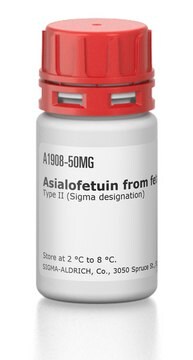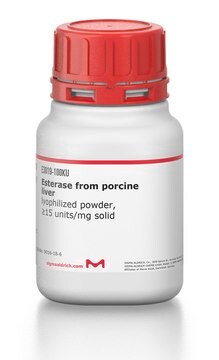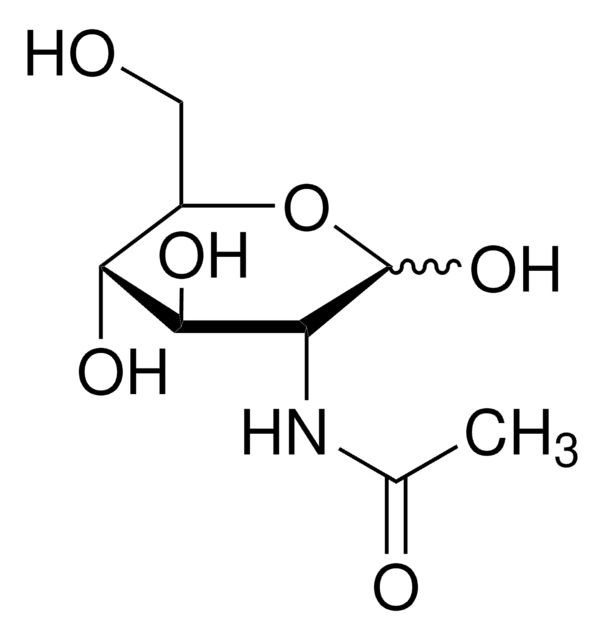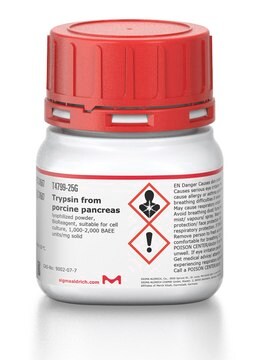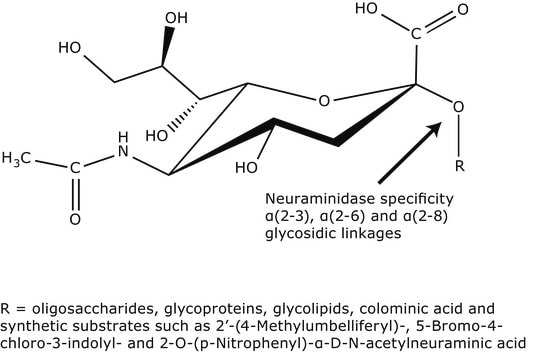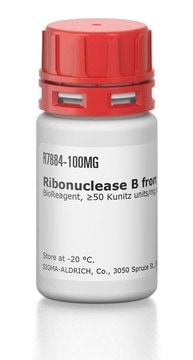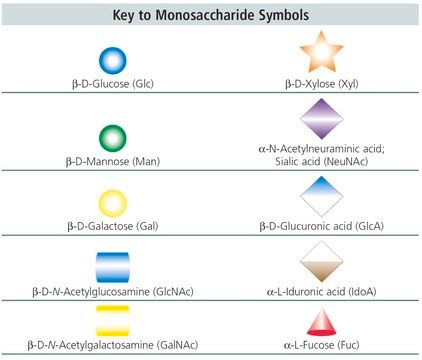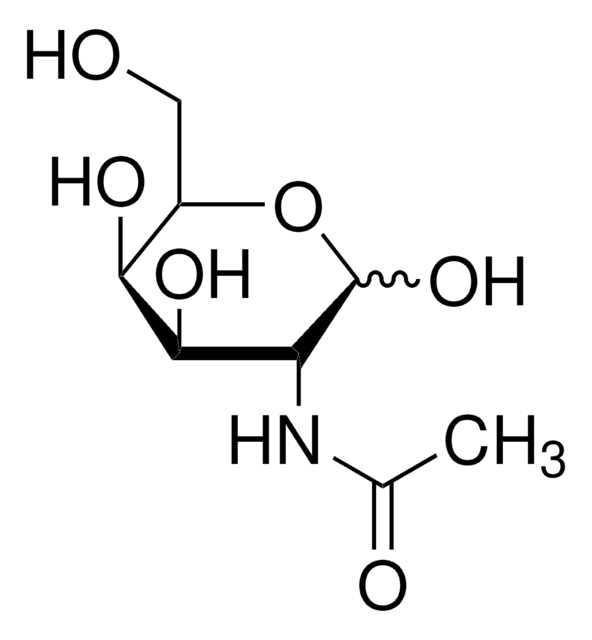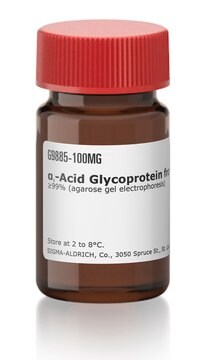A4781
Asialofetuin from fetal calf serum
Type I (Sigma designation)
Synonym(s):
Asialofetuin
Sign Into View Organizational & Contract Pricing
All Photos(3)
About This Item
Recommended Products
biological source
bovine (calf) serum
Quality Level
type
Type I (Sigma designation)
form
powder
impurities
salt, essentially free
≤0.5% N-acetylneuraminic acid
solubility
0.85% sodium chloride: soluble 1 mg/mL
storage temp.
2-8°C
Looking for similar products? Visit Product Comparison Guide
General description
Asialofetuin is a glycoprotein with three asparagine-linked triantennary complex carbohydrate chains and terminal N-acetylgalactosamine residues.
Application
Asialofetuin from fetal calf serum has been used:
- to quantitate the plant Ricin toxin′s B subunit (RTB) lectin activity in β-phaseolin signal peptide (P)–proinsulin gene (INS)–RTB plants by enzyme-linked immunosorbent assay (ELISA)
- quantitate VP7:RTB fusion protein in transformed potato tissues by ELISA
- as a glycoprotein substrate to measure the receptor-binding activity of recombinant RTB and NSP490–RTB fusion proteins
- to study the nature of the interaction between ferritin and the placenta
Incorporation of asialofetuin (AF) in liposomes strongly enhance delivery to and endocytosis by cells displaying the AF receptor, notably hepatocytes. This provides a very efficient route for gene therapy.
Biochem/physiol Actions
Asialofetuin exhibits affinity to asialoglycoprotein receptor (ASGP-R) on hepatocytes and uses the receptor to enter the cell. This property allows asialofetuin to be used as a ligand to deliver drugs to hepatocytes and as a competitive inhibitor to ASGP-R.
Preparation Note
Prepared by a modification of Spiro, R.G., J. Biol. Chem., 235, 2860 (1960).
Storage Class Code
11 - Combustible Solids
WGK
WGK 3
Flash Point(F)
Not applicable
Flash Point(C)
Not applicable
Personal Protective Equipment
dust mask type N95 (US), Eyeshields, Gloves
Certificates of Analysis (COA)
Search for Certificates of Analysis (COA) by entering the products Lot/Batch Number. Lot and Batch Numbers can be found on a product’s label following the words ‘Lot’ or ‘Batch’.
Already Own This Product?
Find documentation for the products that you have recently purchased in the Document Library.
Customers Also Viewed
Keiichi Motoyama et al.
Journal of drug delivery, 2011, 476137-476137 (2011-04-15)
The purpose of this study is to evaluate in vitro gene delivery mediated by asialofetuin-appended cationic liposomes (AF-liposomes) associating cyclodextrins (CyD/AF-liposomes) as a hepatocyte-selective nonviral vector. Of various CyDs, AF-liposomes associated with plasmid DNA (pDNA) and γ-cyclodextrin (γ-CyD) (pDNA/γ-CyD/AF-liposomes) showed
R D Lamparelli et al.
British journal of haematology, 72(1), 100-105 (1989-05-01)
The organ distribution of intravenously injected hepatic ferritin either labelled with 59Fe or with 59Fe and 125I, was studied in pregnant guinea-pigs. At 5 h 71.2% of injected 59Fe was present in the placenta and fetus. Transfer of 59Fe to
Nida Zaidi et al.
International journal of biological macromolecules, 103, 65-73 (2017-05-13)
The SDS-glycoprotein system is mimic of membrane protein-lipid system. Fate of glycoprotein, conformation and the interactive forces involved in membrane milieu are expected to be decided by the net charge on glycoprotein that may change during acidic environment in a
Jakob Meier-Credo et al.
Journal of the American Society for Mass Spectrometry, 33(7), 1293-1302 (2022-06-28)
Identification and sequence determination by mass spectrometry have become routine analyses for soluble proteins. Membrane proteins, however, remain challenging targets due to their hydrophobicity and poor annotation. In particular small membrane proteins often remain unnoticed as they are largely inaccessible
Nak-Won Choi et al.
Journal of biotechnology, 121(2), 272-283 (2005-09-27)
The castor-oil plant Ricinus communis A-B dimeric toxin B subunit (RTB) was genetically linked at its N-terminus with a 90 amino acid peptide from simian rotavirus SA-11 non-structural protein NSP4(90) and produced in Escherichia coli BL21 cells. Biologically active recombinant
Our team of scientists has experience in all areas of research including Life Science, Material Science, Chemical Synthesis, Chromatography, Analytical and many others.
Contact Technical Service

